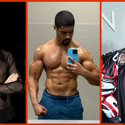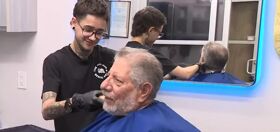
To figure out how to rank colleges as “gay-friendly,” the Princeton Review asked just one question to the 122,000 students it surveys. And it was a terrible question, at that. Some people think this is a faulty methodology.
Because it so is! And quite problematic for students and their families who want to send their kid off to a campus where there’s a welcoming queer population.

New York University and Stanford are the gay-friendliest schools, says the Princeton Review’s latest rankings. The third pick was a tiny school called the New College of Florida. And the Review also ranked the gay-unfriendliest, which led to a drag queen staffer at Southern Methodist University trying to save his school’s rep.
But to get those rankings, the Review relied on answers to a single question: Do you agree or disagree that “students, faculty, and administrators treat all persons equally regardless of their sexual orientation and gender identity/expression”? The more “Yes” answers, the higher up the school’s ranking went.
How about we take this to the next level?
Our newsletter is like a refreshing cocktail (or mocktail) of LGBTQ+ entertainment and pop culture, served up with a side of eye-candy.
It’s a pretty generic question to determine what’s unarguably a huge criteria for America’s graduating high school gays. And that’s what the group Campus Pride (an organization “for student leaders and campus organizations working to create safer, more LGBT-friendly colleges and universities”) is arguing in a new report that says the Princeton Review’s gay-friendly ranking aren’t just worrisome, but they’re practically malpractice. Reads a statement:
“This list is an erroneous, misleading indicator of acceptance for LGBT youth and their safety on campus,” said Shane Windmeyer, founder and executive director of Campus Pride and the author of The Advocate College Guide for LGBT Students, the first-ever guide profiling the 100 Best LGBT-Friendly Colleges, released in 2006 by Alyson Books. “The majority of students responding to such a question – irrespective of response – will be straight. Their perceptions of equality are likely quite different from those of LGBT students.”
While Princeton Review— a widely trusted company—believes that their rankings are created to help parents and students determine which school is right for them, Campus Pride believes that parents who are truly concerned for their children’s safety and well-being will be misled by these particular findings. Campus Pride strongly believes that given the rise in violence and harassment among LGBT students, there are serious issues to consider when looking for the right college.
Another reason for concern is the dated use of the words ‘alternative lifestyle’ when referring to the lives of LGBT people. “It’s disrespectful and out of touch because it alludes that being gay is a choice and something that can be cured,” Windmeyer said. “The insensitivity to language is a major warning sign that this guide does not have the nuanced perspective to be a trusted resource and to truly understand the complexity of LGBT students’ lives and needs.”

So what’s the alternative? Well Campus Pride has its own rankings! The Campus Climate Index is available free to students and parents, and goes much more in depth into all things gay-friendly. There, schools are ranked on a 5-star scale, calculated on a set of factors like student life, academic life, campus safety, and policy inclusion. (There are also separate scores for sexual orientation and gender identity; interesting.)
Which schools score well on this index? Princeton, Syracuse, Penn State, UC Berkeley, UPenn, and the University of Vermont, among others. Way at the bottom? University of Southern Indiana and Carroll Community College in Maryland.
And how did the Princeton Review’s top picks compare? NYU scored 4 out of 5 stars, while neither Stanford nor New College of Florida were ranked.
Is either guide perfect? Of course not. But the more information students have — and the more they understand how schools earn these scores — the better. And then there’s the tried and true method of knowing whether a campus will satisfy your gay-friendly needs: ask current and former students. We hear there’s this amazing thing called “Facebook” that can help you with that.



















Sceth
*Ahem* regardless of rankings, I can tell you first-hand that Stanford is one of the gayest schools out there. All you have to do is ask someone if you want to find out. There are lots of forums for that.
galefan2004
I really don’t understand this whole concept of “gay friendly colleges”. Seriously, rather the college is “gay friendly” or not is at the absolute bottom of my list of reasons to pick a college. The list should go something more like reputation of the school, success of the department, price of the school and location of the school. Being “gay friendly” has no place on the list. If the school isn’t gay friendly but is the best school in the area for the program I think I’d go with the program and just deal with some hostility till I’m done there.
AlwaysGay
Thank you Shane Windmeyer for speaking up on our behalf and bringing this to our attention. We need more gay people like you working on OUR behalf. Support Shane and his website because he is supporting you.
Galefan, hostility does affect gay students’ grades and participation. I know first hand. A gay-friendly environment is significant for gay students to learn without the constant hostile and exclusionary tactics of heterosexuals.
hmmm
@galefan2004: They are not saying that gay-friendly should be one’s only criterion or even a main criterion when picking a college. But to the extent that a student cares about it and wants it to be one of many criteria (including prestige, strength of the particular program, etc.) they offer a ranking. What is wrong with that? I certainly cared about how gay-friendly a school was when I was picking colleges. And, by the way, went to Stanford and it was queer as the red carpet of the Tonys. In other words, it was awesome.
kelli Busey
I think that’s a good question. The reactions locally the past two years to SMU’s awful rating have been mixed. We have heard that SMU is a incredibly LBGT accepting all the way to totally intolerant school.
galefan2004
@hmmm: I’m not saying its bad to have such a ranking. I’m saying its bad to base your decision of what university you are going to attend SOLELY off of how gay friendly it is. There is nothing wrong with considering how gay friendly as school is before you go there, but it should be near the bottom of the list IN MY OPINION!
Faeelin
NYU… That’s the school that has a campus in Abu Dhabi, where homosexuality is illegal, and has a law school whose dean thinks whether or not sodomy laws are a social good (to cut down on bug chasing, apparently) is a legitimate academic discussion?
Right.
Yuki
@galefan2004:
Well, the thing is, some colleges do actively kick you out if you’re gay. (For example. Bringham Young University.) So, even if BYU were the best school for a subject, I think that it needs to be taken into account, because I know I certainly wouldn’t want to go there even if I could get the best education; definitely not as the top criterion, but it can be important.
galefan2004
@Yuki: I’m well aware of the problem of discrimination in higher education. However, its a far stretch to go from “some colleges kick you out for being gay” to “this college has the most after hour parties for gay people”.
Also, I don’t think that you can make the argument that any of these schools are top in their field in any given subject except maybe religious persecution. Most of these schools still teach creation over evolution in their science departments. Lets not over look the fact that GW hired lawyers from these schools in mass and that helped him to fuck this country up.
Now, if the question came down to coming out at school or going to the best possible school for a subject matter I think I’d side with the second best school over being in the closet at school. Then again, I somehow lost the ability to change pronouns (you know like you have to do if you are in the closet and talking about your SO) so I probably couldn’t be closeted now if I tried.
Jack
I’m at a college that purposefully didn’t take the campus climate index because they knew the results wouldn’t be favorable. Which is backstabbing but also, negative results discourage kids from coming to schools that really need an influx of smart, active LGBT students.
Also, campus climate index doesn’t release any of the raw data taken from the survey to the schools (at least not for very cheap) and so there’s no way for schools to actually learn anything about their own campus climate… just whether it’s good or bad.
Both systems suck. LGBT student’s opinions are the best indicator, not some 30 dollar book or expensive test.
Daniel
The best schools are in the states where human rights are not violated and where equal protection under law is upheld (you know, that silly requirement of democracy that’s so inconvenient for so many Americans to actually maintain).
mikeandrewsdantescove
Wow being from the bay area, I was shocked that Stanford ranked ahead of Cal Berkeley.
Mike
http://jjadams928.blogspot.com/
Cat
Penn State Univ.? Really!?! Queer students have had to fight for a Queer Studies program for over 10yrs; and PSU just settled it’s 2nd discrimination suit on Oct 5th (see the article)http://www.equalitypa.org/news/news_view.php?news_id=88
Try one of the best schools for tokenism and queer bashing!!!